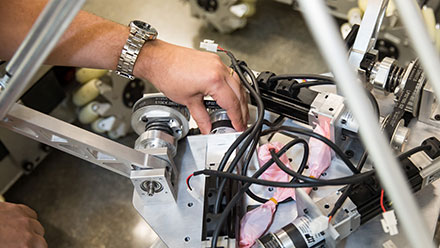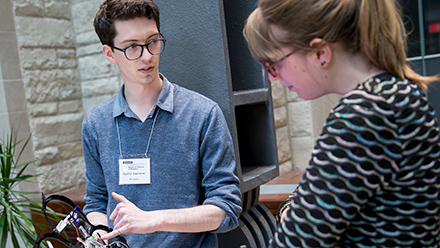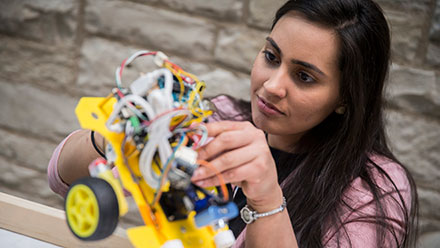How to Immerse Yourself in Robotics
Complete sophisticated robotics projects after only two months in our program.
Launch a robotics career through an intense curriculum, hands-on projects, and an industry-ready portfolio.
The future is bright for the cutting-edge field of robotics, which is forecasted to grow substantially over the next 20 years. Roboticists will be required to have expertise in computer science, mechanical engineering, electrical engineering, biomedical engineering, and mathematics. This range of requirements often leaves a gap between an undergraduate’s abilities and the needs of industry.
The Master of Science in Robotics (MSR) program aims to bridge that knowledge and experience gap through its intense, hands-on approach to learning. Our graduates leave prepared for jobs with leading companies, for their own entrepreneurial adventures, or with a solid foundation for pursuing a PhD.
Complete sophisticated robotics projects after only two months in our program.
Explore ideas and topics that interest you through your Final Project.
Overcome the hurdles roboticists face through hands-on projects.
The basics at-a-glance
Degree earned: Master of Science in Robotics
LocationNorthwestern University’s Evanston campus | Timing12-15 months full-time (depending on optional summer internship) | Class SizeSmall cohort of 15-20 students | AdmissionsRecommended submission deadline: Final deadline: First consideration given to applications received by recommended submission deadline Application opens |
Unique program features
Our program is designed for passionate, problem-solving, and deeply curious professionals with the desire to work in robotics or artificial intelligence. While exposing students to a broad range of engineering and other disciplines, the rigor of our curriculum coupled with our hands-on, project-based work enables our graduates to chart their own career path and choose from the ever-growing options in this exciting field.

Develop sought-after robotics-relevant knowledge and experience in computer science, mathematics, and mechanical, electrical, and biomedical engineering.
Collaborate with world-class faculty on work including swarm and aerial robotics, robotic manipulation, haptic interfaces, bio-inspired sensing and control, and prosthetics engineering.

Gain hands-on experience working on cutting-edge Northwestern research projects and with other leading industrial program partners like the Shirley Ryan AbilityLab.
Graduate with an indispensable project portfolio that demonstrates your experience, capabilities, and knowledge.

Engage in a small cohort of like-minded students, which encourages peer-learning and the building of strong professional and social networks.
Benefit from the nimble nature of our program which allows for faculty to focus on developing students’ individual technical and professional skills.

Students and alumni have been hired for internships and full-time positions across a wide array of companies including 3M, Apple, Auris Health, Boeing, Boston Dynamics, and Waymo.
Those with entrepreneurial spirits have been involved with startups, and still others have chosen to pursue a PhD at prestigious schools.
View featured work created by the students in our program.
Our students develop an online portfolio showcasing the projects they’ve completed. The greatest benefit these portfolios create is the industry-ready tool the students use to share their work with potential employers or PhD programs.
Ava Zahedi looks back on how she used machine learning in MSR and how those experiences prepared her for her current work as a robotics and automation software engineer at Kasalis.
Yael Ben Shalom (MSR '21) talked about her summer internship with Augean Robotics and how the hands-on curriculum of Northwestern Engineering's Master of Science in Robotics (MSR) program prepared her to take a system from idea to proof of concept.
Ashlee Tiwari fielded job offers from some of the country’s top technology companies; her time in the MSR program helped make her choice obvious.
Anna Garverick’s summer internship leaned on her MSR lessons to help bring joy and functionality back to stroke survivor Henry Evans.